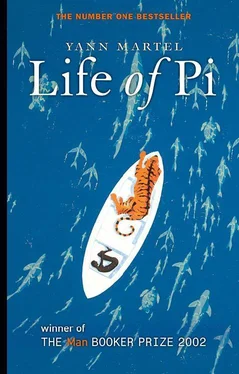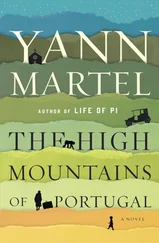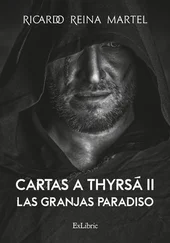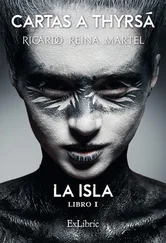“Yes?”
“The Tsimtsum sank on July 2nd, 1977.”
“Yes.”
“And I arrived on the coast of Mexico, the sole human survivor of the Tsimtsum , on February 14th, 1978.”
“That’s right.”
“I told you two stories that account for the 227 days in between.”
“Yes, you did.”
“Neither explains the sinking of the Tsimtsum .”
“That’s right.”
“Neither makes a factual difference to you.”
“That’s true.”
“You can’t prove which story is true and which is not. You must take my word for it.”
“I guess so.”
“In both stories the ship sinks, my entire family dies, and I suffer.”
“Yes, that’s true.”
“So tell me, since it makes no factual difference to you and you can’t prove the question either way, which story do you prefer? Which is the better story, the story with animals or the story without animals?”
Mr. Okamoto: “That’s an interesting question …”
Mr. Chiba: “The story with animals.”
Mr. Okamoto: “Yes.The story with animals is the better story.”
Pi Patel: “Thank you. And so it goes with God.”
[Silence]
Mr. Okamoto: “You’re welcome.”
Mr. Chiba: “What did he just say?”
Mr. Okamoto: “I don’t know.”
Mr. Chiba: “Oh look—he’s crying.”
[Long silence]
Mr. Okamoto: “We’ll be careful when we drive away. We don’t want to run into Richard Parker.”
Pi Patel: “Don’t worry, you won’t. He’s hiding somewhere you’ll never find him.”
Mr. Okamoto: “Thank you for taking the time to talk to us, Mr. Patel. We’re grateful. And we’re really very sorry about what happened to you.”
“Thank you.”
“What will you be doing now?”
“I guess I’ll go to Canada.”
“Not back to India?”
“No. There’s nothing there for me now. Only sad memories.”
“Of course, you know you will be getting insurance money.”
“Oh.”
“Yes. Oika will be in touch with you.”
[Silence]
Mr. Okamoto: “We should be going. We wish you all the best, Mr. Patel.”
Mr. Chiba: “Yes, all the best.”
“Thank you.”
Mr. Okamoto: “Goodbye.”
Mr. Chiba: “Goodbye.”
Pi Patel: “Would you like some cookies for the road?”
Mr. Okamoto: “That would be nice.”
“Here, have three each.”
“Thank you.”
Mr. Chiba: “Thank you.”
“You’re welcome. Goodbye. God be with you, my brothers.”
“Thank you. And with you too, Mr. Patel.”
Mr. Chiba: “Goodbye.”
Mr. Okamoto: “I’m starving. Let’s go eat. You can turn that off.”
Mr. Okamoto, in his letter to me, recalled the interrogation as having been “difficult and memorable.” He remembered Piscine Molitor Patel as being “very thin, very tough, very bright.”
His report, in its essential part, ran as follows:
Sole survivor could shed no light on reasons for sinking of Tsimtsum. Ship appears to have sunk very quickly, which would indicate a major hull breach. Important quantity of debris would support this theory. But precise reason of breach impossible to determine. No major weather disturbance reported that day in quadrant. Survivor’s assessment of weather impressionistic and unreliable. At most, weather a contributing factor. Cause was perhaps internal to ship. Survivor believes he heard an explosion, hinting at a major engine problem, possibly the explosion of a boiler, but this is speculation. Ship twenty - nine years old (Erlandson and Skank Shipyards, Malmö, 1948), refitted in 1970. Stress of weather combined with structural fatigue a possibility, but conjecture. No other ship mishap reported in area on that day, so ship-ship collision unlikely. Collision with debris a possibility, but unverifiable. Collision with a floating mine might explain explosion, but seems fanciful, besides highly unlikely as sinking started at stern, which in all likelihood would mean that hull breach was at stern too. Survivor cast doubts on fitness of crew but had nothing to say about officers. Oika Shipping Company claims all cargo absolutely licit and not aware of any officer or crew problems .
Cause of sinking impossible to determine from available evidence. Standard insurance claim procedure for Oika. No further action required. Recommend that case be closed .
As an aside, story of sole survivor, Mr. Piscine Molitor Patel, Indian citizen, is an astounding story of courage and endurance in the face of extraordinarily difficult and tragic circumstances. In the experience of this investigator, his story is unparalleled in the history of shipwrecks. Very few castaways can claim to have survived so long at sea as Mr. Patel, and none in the company of an adult Bengal tiger .
God, survival and tiger behaviour. It’s hard to imagine a more invigorating combination of discussion topics. We hope that the following questions will enrich your reading of Pi’s fantastic journey. After all, Pi didn’t have to make his voyage alone; neither should you. May this guide serve as a pleasant companion .
1. In his introductory note Yann Martel says, “This book was born as I was hungry.” What sort of emotional nourishment might Life of Pi have fed to its author?
2. Pondicherry is described as an anomaly, the former capital of what was once French India. Do you think the town made a significant difference in Pi’s upbringing?
3. In the Author’s Note, Mr. Adirubasamy boldly claims that this story “will make you believe in God”, and the author, after researching and writing the story, agrees. Did Pi’s tale alter your beliefs about God?
4. Chapters 21 and 22 are very short, yet the author has said that they are at the core of the novel. Can you see how?
5. Early in the novel, we discover that Pi majored in religious studies and zoology, with particular interests in a sixteenth-century Kabbalist and the admirable three-toed sloth. In subsequent chapters, he explains the ways in which religions and zoos are both steeped in illusion. Discuss some of the other ways in which these two fields find unlikely compatibility.
6. In the Author’s Note, Martel wonders whether fiction is “the selective transforming of reality, the twisting of it to bring out its essence.” If this is so, what is the essence of Pi and of his story?
7. There is a lot of storytelling in this religious novel. Is there a relationship between religion and storytelling? Is religion a form of storytelling? Is there a theological dimension to storytelling?
8. Pi’s full name, Piscine Molitor Patel, was inspired by a Parisian swimming pool that “the gods would have delighted to swim in”. The shortened form refers to the ratio of a circle’s circumference divided by its diameter, the number 3.1415926 …, a number that goes on forever without discernible pattern, what in mathematics is called an irrational number. Explore the significance of Pi’s unusual name.
9. One reviewer said the novel contains hints of The Old Man and the Sea , and Pi himself measures his experience in relation to history’s most famous castaways. How does Life of Pi compare to other maritime novels and films?
10. How might the novel’s flavour have been changed if the sole surviving animal had been the zebra with the broken leg? Or Orange Juice? Or the hyena? Would Pi have survived with a harmless animal or an ugly animal, say a sheep or a turkey? Which animal would you like to find yourself with on a lifeboat?
Читать дальше












